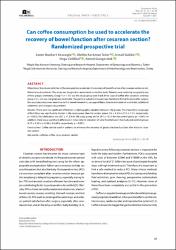Can coffee consumption be used to accelerate the recovery of bowel function after cesarean section? Randomized prospective trial
Abstract
Objectives:To evaluate whether coffee consumption accelerates the recovery of bowel function after cesarean section or not. Material and methods: This study was designed as randomized controlled study. Patients were randomly assigned to one of two groups: Ultimately, Group 1 (n = 51) was the study group and drank three cups of coffee after cesarean, whereas group 2 (n = 52) was not given any treatment. The primary outcome measure was the time to first defecation after surgery, the secondary outcomes were time to first bowel movement, passage of flatus, time to toleration of a solid diet, additional antiemetic and analgesic requirement. Results: There were no significant differences in demographic variables between the groups. The mean time to passage of first flatus was significantly shorter in the study group than the control group (8.6 +/- 3.3 h vs 11.3 +/- 7.5 h, respectively; p = 0.022). First defecation was 20.7 +/- 11.5 h for the study group and at 29.1 +/- 14.3 h for the control group (p = 0.001). In addition, there was a significant difference in mean time to toleration of solid food between the study and control groups (8.78 +/- 2.33 h vs 12.88 +/- 4.2.60 h, respectively; p < 0.001). Conclusions: Coffee can be used in patients to enhance the recovery of gastrointestinal function after elective cesarean section.


















